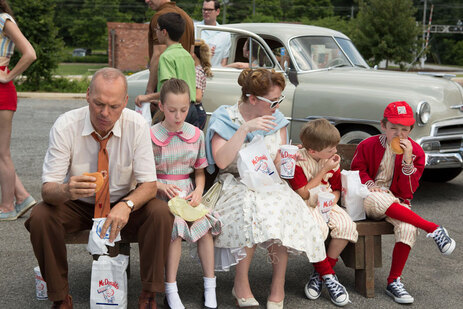B- | A down-on-his-luck salesman happens upon the first fast food restaurant and feels compelled to spread them across the country. Directed by John Lee Hancock Starring Michael Keaton, Nick Offerman, and John Carroll Lynch Review by Jon Kissel |

This is strictly a story about invention and acquisition with no consideration for the impact that business would have on the economy or the environment. Kroc tosses off that he likes employing teenagers with no follow-up. Could he like them because he can underpay them? How about waste and consumption and health? The film treats the emergence of fast food as an unalloyed good, fitting for an American idealizer like Hancock, even as it views unsavory business practices with the slightest of side-eyes. The McDonald’s brothers Mac and Dick (John Carroll Lynch and Offerman) aren’t full heroes because they keep their jewel from the people. To keep the viewer from considering Kroc as a full anti-hero, they don’t include a scene of second wife Joan (Linda Cardellini) informing her husband (Patrick Wilson) that she’s leaving him while also including scenes of Kroc loosening the noose from around the McDonalds’ necks and ultimately feeling guilty about the whole endeavor. Why does Hancock feel that it's necessary for Kroc to be redeemable? Why can’t The Founder commit to making him a challenging protagonist?
While we’re asking questions about how The Founder views and presents its characters, we may as well ask some of his cinematic choices as well. Why does he momentarily turn the film into a Ken Burns documentary complete with black and white photos of the past? Why send Kroc to On the Waterfront if you’re not going to show a relevant clip of the movie? Why include shot after shot of Kroc driving across the country? Why is there a 15-year age difference between Keaton and first wife Ethel (Laura Dern) and a 24-year one between Keaton and Cardellini? That one’s actually rhetorical. Why is the romance between Keaton and Cardellini nonexistent and taken for granted? Perhaps most glaringly, does the film truly expect the viewer to believe that a burger that’s been sitting in a wrapper under a heat lamp is the best burger Kroc has ever had? That first McDonald’s can’t just have quick turnaround but the food also has to be singular?
It’s not that surprising that The Founder has nothing to say about any potential negative effects of fast food taking over the country, but my biggest question regards Kroc and Ethel’s marriage. A film that had interest in being anything other than a marginally-edgy biopic would have given Ethel some amount of catharsis after the divorce is callously announced. Instead, Kroc treats her horribly with his constant striving and lies. He gives her no credit when she gets onboard with him and starts recruiting franchisees, and then she leaves the film after that single-carrot-slice-on-the-fork dinner. Kroc chalks this up to her not being the specific kind of partner he wants, or lacking ambition, but despite all the time the film spends with him, we don’t really find out why he wants that kind of partner or why he’s so ambitious. He is because this is America, or at least that’s all the film cares to answer. Dern and Cardellini are actors capable of greatness, but Hancock asks essentially nothing of them.
The film asks more of Keaton, Offerman, and Lynch, and all three deliver, thus pushing The Founder to respectable watchability. Each is given enough personal moments or grace notes to get through the origin story explication or sales pitches the script otherwise requires of them. Keaton humanizes his character in such a profound way when he puts his hands in the dirt of his future McDonald’s franchise. If the film followed through and made him a complete jerk in what followed, that moment would’ve sustained the character. Offerman’s Dick is not so far from Ron Swanson, a taskmaster who wants things done exactly the way he wants them done, but he’s also a romantic at heart, as evidenced by the best arches in the film present on Dick’s face as he struggles not to burst into tears during Kroc’s Do It For America pitch, or the glee he takes after perfecting his food prep symphony. Lynch’s cheerful softie rhymes with his husband character in Fargo, a born supporter too good to have any kind of response when he runs into someone outside of his moral imagination.
The main trio of actors make The Founder, but I can’t help thinking about the better version of this film, one that invests more heavily in the questions that lurk below its surface. Hancock simply lacks the vision to interrogate why more is superior to enough, why the salesman is preferred to the inventor. I left The Founder mostly entertained but this is a film as ethereal as it is shallow. The smell of grease on Dick’s clothes will last far longer than the impression left by The Founder. I will say, though, that I could use a glass of that orange drink so prominently placed on the McDonald’s counter. Such a request would require going to a McDonald’s. No orange drink is worth that. C
 RSS Feed
RSS Feed